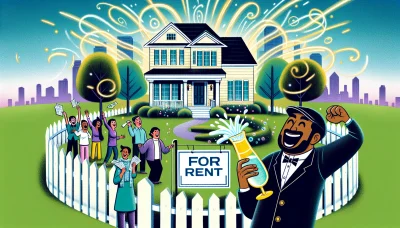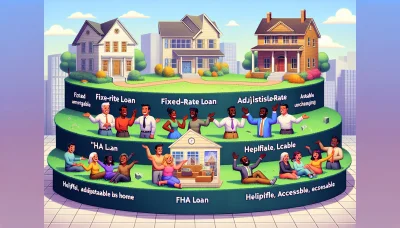Buying a second home Quiz
Test Your Knowledge
Question of
Understanding the Basics of Second-Home Ownership
Defining Your Purpose for Buying a Second Home
Before diving into second-home ownership, clarify your motivations. Is it a place to escape for vacations or a strategic investment? Your purpose will significantly influence your decisions, from location to type of property.
A vacation retreat offers a personal haven to unwind. It's an opportunity to own a slice of paradise in your favorite holiday destination. Location is key, and you'll want to choose somewhere you love that's also accessible.
Investment property is about financial gains. You're looking at market trends, rental potential, and long-term property value appreciation. It's less about personal preference and more about what will appeal to the rental market.
Retirement planning involves looking ahead to your golden years. A second home can be a future primary residence or a place for family gatherings. Consider accessibility, healthcare facilities, and community when choosing this home.
Financial Implications and Budgeting
Understanding the financial landscape of second-home ownership is crucial. Budgeting extends beyond the purchase price; it encompasses mortgages, insurance, taxes, and maintenance costs.
Mortgages and financing options vary for second homes. Interest rates may be higher, and down payment requirements can differ from primary residences. Shop around for the best mortgage deals and consider how the payments fit within your financial plan.
- Tax Considerations and Benefits: Get familiar with tax implications as they can affect your overall costs. Some homeowners can deduct mortgage interest and property taxes on their second homes.
- Ongoing Costs: Beyond mortgage expenses, factor in utilities, homeowners' association fees, landscaping, repairs, and potentially property management services.
- Maintenance: Regular maintenance prevents costly repairs down the line. If your second home is far away or vacant for periods, hiring a property manager might be beneficial.
Choosing the Right Location for Your Second Home
Evaluating Potential Destinations
Selecting the perfect spot for your second home is exhilarating! Imagine a place that aligns with your dream climatewhether you're after sun-soaked beaches or crisp mountain air. Consider how the weather patterns will affect your stay. Will you be able to enjoy outdoor activities, or will seasonal changes limit your plans?
Think about what you want nearby. Do you crave the convenience of city amenities or the charm of local attractions? Proximity to shopping centers, restaurants, and entertainment can transform your experience. Ensure easy access to your favorite pastimes, whether it's theater shows, golf courses, or scenic parks.
Don't overlook the significance of local real estate market trends. Are property values on the rise? Is the area trending among second-home buyers? Understanding these dynamics can guide you towards a wise investment and ensure your second home is both a sanctuary and a savvy financial move.
Climate and Weather Patterns
Dive into climate research! It's not just about today's weather but also understanding long-term trends. Will global warming affect your coastal paradise or ski resort? Assessing future climate risks is as crucial as enjoying today's perfect sunset.
Seasonal variations can make or break your second home experience. Imagine buying a beach house only to find it's hurricane-prone, or a cabin where winters are too harsh for comfort. Your ideal escape should offer year-round enjoyment, so let's make sure it does!
Proximity to Amenities and Attractions
Your second home should be a launchpad for adventure! Whether it's fine dining, unique shopping experiences, or outdoor adventures, proximity to these amenities adds immense value to your leisure time. It's all about location, location, location!
Attractions aren't just for tourists; they're for you to savor every visit! From cultural landmarks to natural wonders, having access to attractions enriches your stays and ensures theres always something new to explore.
Local Real Estate Market Trends
Analyze the market like a pro! Look at historical data and current trendsthis isn't just another purchase; it's an investment in your lifestyle and financial future. The right timing could mean equity growth alongside countless getaways.
Consider enlisting a local real estate expertthey have the scoop on market fluctuations and can provide invaluable insights into when and where to buy. Their knowledge could be the key to unlocking your dream home at the best value.
Assessing the Community and Lifestyle
Safety isn't just a buzzword; it's paramount when choosing your second home. Research crime rates and talk to localsensure peace of mind by confirming that safety measures and community watch programs are in place.
- Check Crime Statistics: Use online tools and local resources to understand crime levels in potential neighborhoods.
- Talk to Residents: Engage with community members for firsthand accounts of security concerns or endorsements.
- Observe Day & Night: Visit the area at different times to gauge activity levels and safety day-round.
- Evaluate Lighting & Roads: Well-lit streets with good infrastructure often correlate with safer environments.
- School Quality: High-performing schools can be an indicator of community investment and lower crime rates.
- Policing Presence: Visible law enforcement can deter crime and enhance security perceptions.
- Community Programs: Active neighborhood associations and watch programs demonstrate communal vigilance.
- CCTV Cameras: Check if there are surveillance systems in public areas for added security measures.
Cultural vibrancy adds color to life! A community rich in arts, music, and history offers endless enrichment. Museums, galleries, theatersare these cultural havens within reach? They can turn weekend escapes into soulful retreats!
Fuel your passion for recreation! Are there parks, trails, or beaches nearby? Access to recreational facilities means more than funit signifies an active lifestyle that keeps you energized visit after visit!
Last but not least: Don't underestimate infrastructure. Reliable internet, healthcare facilities, schoolseven if they're not for everyday use, their quality speaks volumes about the area's development and potential growth!
Your comfort matters! From utility services to public transportevery aspect plays into creating seamless stays at your second home. Ensuring these services are up to standard is non-negotiable for truly carefree living!
The Search for the Perfect Property
Identifying Your Must-Haves and Deal-Breakers
Finding the perfect property starts with a clear understanding of your needs. Identify your must-haves, such as the number of bedrooms or proximity to work, and deal-breakers, like a busy street or lack of outdoor space. This clarity will streamline your search and help you focus on properties that truly fit your lifestyle.
When considering size and layout, think not just about your current situation but also potential life changes. A flexible layout can accommodate an expanding family or home office needs. Remember, altering the structure later can be costly, so choose wisely from the start.
Amenities play a crucial role in day-to-day comfort. Essential features might include a modern kitchen, energy-efficient appliances, or smart home technology. Don't overlook community amenities such as parks, gyms, or pools which add value to your living experience.
Lastly, consider the property's long-term value. Research local market trends and development plans to ensure your investment has growth potential. Properties in up-and-coming areas may offer more significant returns over time compared to those in established neighborhoods.
Working with Real Estate Professionals
Collaborating with a local realtor can dramatically enhance your property search. They bring invaluable expertise about the local market and can often access listings before they hit mainstream platforms. Choose a realtor with a proven track record who understands your specific needs.
Don't neglect online resources and listings; they're powerful tools that provide comprehensive information at your fingertips. Use them to research prices, view photos, and read about neighborhood statistics. However, remember online listings may not always be up-to-date.
- Verify Listing Dates: Ensure the property is still on the market by checking listing dates.
- Read Reviews: Look for reviews or testimonials about the real estate professional or agency.
- Check Credentials: Ensure they are licensed and have good standing with local real estate boards.
- Analyze Market Reports: Study recent sales data to understand market conditions.
- Schedule Alerts: Set up notifications for new listings that meet your criteria.
Scheduling visits and inspections are essential steps in the buying process. A visit gives you a feel for the property's true scale and condition, while an inspection can uncover potential issues that could cost you down the line. Always inspect before making an offerit's worth every penny for peace of mind.
Navigating the Buying Process
Making an Offer and Negotiating Terms
When you've found your dream home, it's time to make an offer. This is where the real excitement begins! Ensure your bid reflects the current market conditions and stands out to sellers. Remember, a well-crafted offer can be a powerful tool in negotiations, so make it count!
Negotiating terms is like a strategic dance, where each step must be calculated. You need to be firm yet flexible, making concessions without compromising your interests. It's essential to keep communication open and transparent with the seller to foster a mutually beneficial agreement.
Understanding Market Value and Pricing
Understanding market value is absolutely crucial! Market value determines how much you should offer for a property. You don't want to overpay or insult the seller with a lowball offer. So get this right, and you're halfway there!
Pricing can be tricky; it's more art than science. Consider comparable sales, property condition, and local market trends. Your real estate agent is your ally here, providing insights that will help you make an informed decision that aligns with your financial goals.
Contingencies and Conditions to Include
Contingencies are your safety net in any real estate transaction. They protect you from unforeseen issues that could turn your dream home into a nightmare. Common contingencies include financing, inspection, and appraisal clausesall vital for a secure deal.
Conditions are just as important! They stipulate specific requirements that must be met before the sale goes through. Whether it's a repair that needs addressing or a document that needs signing, these details matter. Be clear about what you expect and stand by your conditions.
Closing the Deal Successfully
Closing the deal is the final stretchexciting yet nerve-wracking! It involves a whirlwind of paperwork, legal formalities, and last-minute details. But stay focused! With careful attention to the closing process, you'll soon cross the finish line into homeownership.
To ensure success at closing, keep all communication lines open between your lender, real estate agent, and attorney. Be ready for some marathon signing sessions and have your funds prepared for closing costsit's going to be worth it when you get those keys in hand!
Legal and Regulatory Considerations
- Property Ownership Laws: National and local laws govern property ownershipknow them well! They affect everything from transfer of ownership to inheritance rights.
- Homeowner Association Rules: If applicable, HOA rules can significantly impact your use of property. Review them thoroughly to avoid any surprises after moving in.
- Zoning and Land Use Restrictions: Zoning laws dictate how you can use your property. Want to build an addition or start a home business? Check zoning restrictions first!
- Title Search: A title search ensures there are no liens or legal encumbrances on the property that could cause problems later on.
- Flood Zone Determination: Knowing if the property is in a flood zone is crucial for insurance purposes and peace of mind.
- Easements: Easements may grant others access or use part of your property; knowing their scope is essential.
- Tax Implications: Understand how buying property will affect your taxesforewarned is forearmed!
The legal landscape of buying a home can seem dauntingbut don't let it intimidate you! Take it step by step: familiarize yourself with property ownership laws to avoid legal pitfalls down the road.
If there's an HOA involved, dive into those rules like they're your new favorite novel because they'll dictate much of what you can do with your new home. And let's not forget about zoning and land-use restrictionsthey're not just bureaucratic red tape; they're essential guidelines for maintaining harmony in your community.
Financing Your Second Home Purchase
Exploring Mortgage Options for Second Homes
When considering the purchase of a second home, navigating through mortgage options can be as thrilling as it is crucial. Conventional loans offer familiar terms, but don't overlook specialty mortgages that cater specifically to second home buyers. These specialized products may provide unique benefits that align perfectly with your investment goals and financial situation.
Interest rates and loan terms for second homes can differ from primary residence financing. It's vital to shop around and compare offers from multiple lenders. A slightly lower interest rate or a more flexible term can save you a significant amount over the life of your loan, making the pursuit of the best deal an exhilarating quest!
Understanding down payment requirements for second homes is keythey tend to be higher than for primary residences. Typically, lenders require at least 10% down, but don't let that dampen your spirits! With careful planning and the right strategy, securing your dream vacation home or investment property is absolutely within reach.
Conventional Loans vs. Specialty Mortgages
The choice between conventional loans and specialty mortgages can make or break your second home financing plan. Conventional loans are widely available and offer stability, while specialty mortgages might provide options like interest-only payments or balloon payments that could suit your particular financial landscape.
Specialty mortgages may come with their own set of criteria which could include higher credit score requirements or proof of additional reserves. The adventure lies in assessing these products against your long-term financial objectives and choosing the path that leads to optimal fiscal health.
Interest Rates and Loan Terms
Digging into the details of interest rates and loan terms unveils opportunities for savvy buyers. Fixed-rate mortgages lock in your interest rate for predictability over time, whereas adjustable-rate mortgages (ARMs) may start lower but fluctuate with market conditions, adding a dash of risk and potential reward to your financial journey.
Longer loan terms mean smaller monthly payments but result in more interest paid over time. Conversely, shorter loan terms increase monthly payments but accrue less interest overall, freeing up future finances for other exciting ventures or investments.
Down Payment Requirements
Lenders typically see second homes as higher risk, which translates into higher down payment demands. This financial hurdle emphasizes the importance of robust savings strategies or exploring creative financing solutions to leap over this barrier smoothly.
- Evaluate Your Finances: Get a clear picture of your current financial standingthis will guide you on how much you can realistically allocate for a down payment without compromising other financial goals.
- Research Market Trends: Understanding local real estate trends can help you time your purchase strategically, potentially reducing the down payment requirement if prices are favorable.
- Consider Liquidating Assets: If you're asset-rich but cash-poor, selling off non-essential assets could free up funds for your down payment without impacting your daily finances.
- Negotiate with Sellers: Sometimes sellers are willing to negotiate on price or terms which could reduce the amount you need upfrontdon't hesitate to engage in this thrilling dance of negotiation!
- Lender Programs: Some lenders offer programs specifically designed to help with down payments on second homesthese programs could be the golden ticket to unlocking your property dreams.
- Avoiding PMI: A down payment of 20% or more can eliminate the need for private mortgage insurance (PMI), saving you money that can be channeled towards other exciting financial opportunities.
Strategies for Managing Down Payments and Closing Costs
Saving for a down payment requires discipline and vision; think of it as amassing a treasure chest that unlocks the door to your new sanctuary. Budgeting becomes an adventure when every dollar saved brings you closer to the tranquil beach house or cozy mountain cabin you desire.
Leveraging equity from your primary residence is like discovering hidden capital in plain sightit's a powerful strategy that can amplify your purchasing capability dramatically. Refinancing or taking out a home equity line of credit (HELOC) could provide the funds needed for that pivotal down payment on your next abode.
Long-Term Management of Your Second Home
Establishing a Maintenance Routine
Creating a consistent maintenance routine is vital for the longevity of your second home. Regular checks can prevent small issues from becoming costly repairs. It's essential to have a checklist of tasks that cover all areas of the property, ensuring nothing is overlooked.
Regular Upkeep and Repairs: Addressing minor repairs promptly can save you time and money in the long run. Keep an eye on wear and tear, and don't delay in fixing leaks, cracks, or electrical problems. A well-maintained home retains its value and prevents larger issues.
Seasonal Maintenance Considerations: Each season brings its own maintenance demands. Prepare your home for winter by insulating pipes and clearing gutters, and get it summer-ready by servicing the air conditioning and checking for pests.
Hiring Property Management Services: If managing your second home becomes overwhelming, consider hiring a property management service. They can handle everything from routine maintenance to guest services if you decide to rent out your home.
Preparing for Absences and Vacancies
Your second home will likely face periods of vacancy. Preparing for these times is crucial to ensure the safety and upkeep of the property. Plan ahead to secure your home and mitigate any risks associated with being away.
Security Measures for When You're Away: Invest in robust security systems to protect your property during absences. Consider smart home technologies that allow remote monitoring. Timed lighting systems and regular property checks by a trusted neighbor or management service can also deter potential intruders.
- Renting Out Your Second Home as a Vacation Rental: This can offset costs but requires careful planning. Ensure you are compliant with local regulations, have proper insurance, and establish clear rental terms.
- Mistakes to Avoid:
- Underestimating ongoing maintenance costs which could lead to financial strain.
- Failing to screen tenants thoroughly may result in property damage or unpaid rents.
- Neglecting local market research could mean missing out on peak rental opportunities.
- Omitting professional photography for listings might reduce rental appeal.
Dealing with Unexpected Issues or Emergencies: Have a plan in place for dealing with emergencies like natural disasters or major repairs. Know who to contact locally for various services, and keep an emergency fund specifically for your second home.












